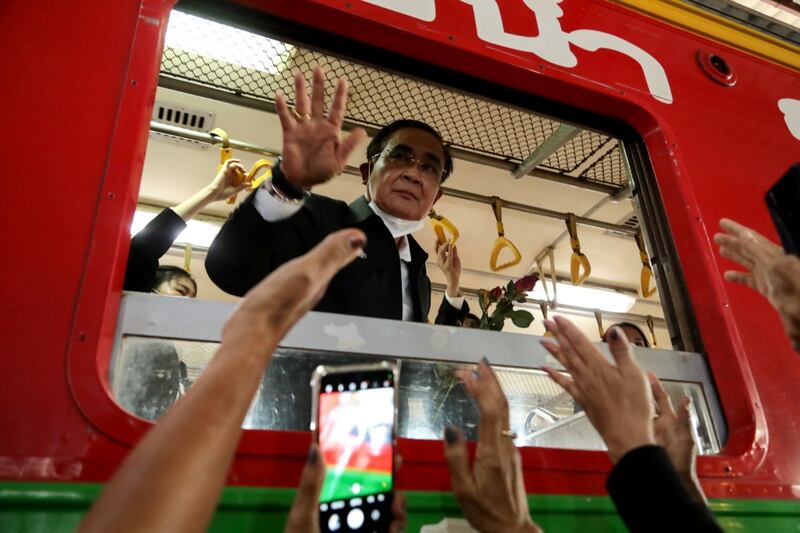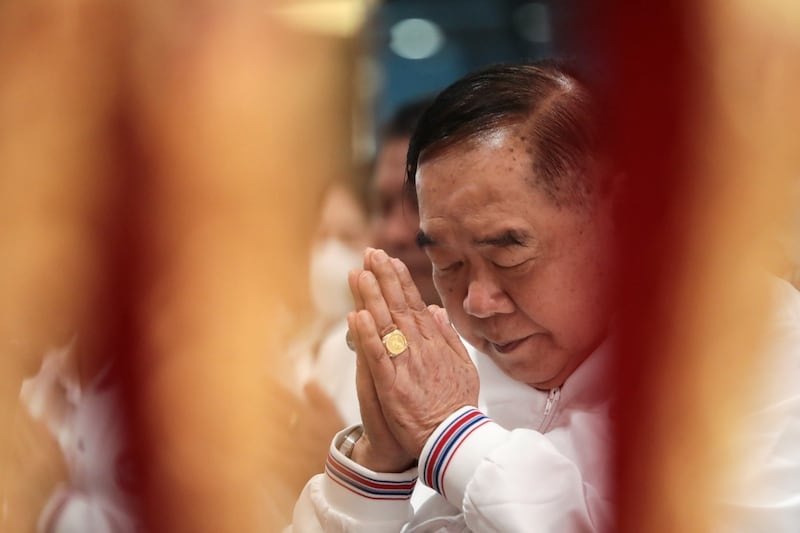Thaksin Shinawatra’s daughter is the most popular candidate for prime minister, opinion surveys show ahead of Thailand’s general election on May 7, but electoral rules put in place to help a coup-leader remain in power may prevent an opposition victory.
Thaksin’s pro-democracy Pheu Thai Party, with allies including the Move Forward Party, could win more than half of the 500 seats in Parliament’s lower house to form a new government, recent polls show.
But the opposition coalition likely would need support from members of the 250-seat Senate, who were hand-picked by Prime Minister Prayuth Chan-o-cha’s administration, to reach the 376-vote threshold to name the government leader.
The Thai constitution was changed before the last election to allow the Senate, whose members are finishing their terms this year, to join lower house lawmakers in voting for the prime minister. This is spurring complaints that the upcoming nationwide polls could be skewed to favor the ruling party even if it lost the popular vote.
Prayuth’s grip on power, however, has loosened lately. His ruling bloc has also become fractured through a schism among Thailand’s former military rulers that potentially could pit him against his deputy prime minister in choosing the next prime minister.
Paetongtarn "Ung Ing" Shinawatra , the 36-year-old and pregnant daughter of Thaksin, an exiled former prime minister who was deposed in a military coup nearly 17 years ago, is spearheading the Pheu Thai Party's campaign in an effort to form a coalition government with other pro-democracy parties.
“[Ung] Ing is ready,” Paetongtarn told supporters during a campaign in northeastern Udon Thani province in January, referring to herself by her nickname.
“We know why we want to win by a landslide – to materialize the policies we promised to people in every province to make their lives better,” she said.
Despite her efforts to lead the campaign, Pheu Thai has not officially named its candidate. Party leader Cholnan Srikaew and Srettha Thavisin, a property tycoon, appear to be alternative candidates.
More than 50 million Thais eligible to vote in May are witnessing the campaigns of candidates representing Pheu Thai and other red-shirted pro-democracy parties, while the royalist bloc, led by the ruling Palang Pracharath Party, wear yellow.
New to the political scene is the blue ideologist bloc led by Prayuth who appears to be slipping in popularity, according to opinion polls.
Prayuth seized power in 2014 after leading a military coup to overthrow the government of Yingluck Shinawatra, Thaksin’s younger sister. An analyst warned that the military could play spoiler this year.
“The intensity of military influence on politics will even increase should the parties from the pro-democracy bloc win the most seats and attempt to form a new government,” Piyapong Pimpalak, of the Social Research Institute at Chiang Mai University, told BenarNews.
“Don’t underestimate the chance of another military coup,” he said, adding that some of the parties include soldier royalists. “I believe there will certainly be changes in politics, but I don’t think the military’s power would easily subside.”
The Pheu Thai Party has a negative history with the military.
In September 2006, Thaksin, as prime minister, was to deliver a speech to the U.N. General Assembly when a military coup overthrew his elected government. The junta cited corruption and questions regarding his loyalty to the monarchy to oust him.
Eight years later, his sister, Yingluck, faced the same fate when she was ousted as PM in a coup spearheaded by Prayuth, then the army chief of staff.
Despite being in self-imposed exile in Dubai, Thaksin is seen as pulling the strings of the pro-democracy parties in his country and has shown a desire to return home.

Upcoming election
The election commission has determined that 400 of the 500-member parliament will be elected in district-wide races while the remaining 100 will be selected from party-list candidates based on the percentages of total votes received.
The ballots will be separated into two, one for individual candidates and another for the party – a move that, observers predict, could favor larger political parties.
A poll by the NIDA (National Institute of Development Administration) in late 2022 showed Paetongtarn favored by 34% of 2,000 respondents who said they liked her party and wanted opportunities for a new generation of politicians.
The Pheu Thai Party and the Move Forward Party are presenting themselves as models for younger generations of Thais who are seeking to reform the monarchy.
The two parties are supported by the Prachachart Party, which is led by Wan Muhamad Noor Matha and popular among the Muslim-dominant Malay-speaking Deep South region.
Pita Limjaroenrat, leader of the Move Forward Party, polled third with support from 13.25% of voters, trailing only Paetongtarn and Prayuth.
Campaigning under the flag of the new United Thai Nation Party , Prayuth, 68, drew support of 14.05% of voters who praised him for his frankness, honesty and ability to keep internal peace.
After Prayuth led the coup in 2014, the junta chief took on the title of prime minister and became the duly elected PM after the March 2019 general election, the nation’s first post-coup polls. He would be forced to leave office by April 5, 2025, if reelected.
The military-backed constitution allows the prime minister to serve a maximum of eight years. In September, the Constitutional Court ruled that the clock against Prayuth started counting down with the new constitution’s adoption in 2017.
Prayuth’s deputy prime minister, Gen. Prawit Wongsuwan, 77, who is the candidate for the ruling Palang Pracharath Party (PPP), did not register in the NIDA polling.
Prayuth and Prawit said they remain close despite the ruling party’s move to back Prawit as the PPP’s choice for PM.
“I used to yell ‘3P forever,’ and I feel so even today, no change,” Prawit said after Prayuth quit the party in January.
“Brotherhood remains. Political rivalry doesn’t hurt it.”

Prayuth, Prawit and Anupong Paochinda, the members of the “3P,” saw themselves as brothers-in-arms during their military careers that led to a coup and control of the government.
Anutin Charnvirakul, another deputy prime minister who is the minister of public health, leads the Bhumjaithai Party, which is likely to remain with the ruling coalition, according to political observers. He received only 5% support in the NIDA poll, finishing seventh.
Anutin is adamant that his party opposes the abolition of Lèse-Majesté, the controversial royal defamation law, while the Democrat Party, another key coalition member, has yet to announce its stance on the issue.
Lèse-Majesté carries a prison term of up to 15 years and has been contentiously enforced after Prayuth threatened in November 2020 to exercise "all pertaining laws" to stop youth-led protests, which sometimes turned violent.
A different survey by the Super Poll Research Office in early January showed that Bhumjaithai finished second among parties at 21.9%, closely trailing Pheu Thai’s 23.4%. PPP drew 8% support.
A state enterprise worker who identified himself as Danuwat because of safety concerns said he hadn’t decided yet who he would vote for, but he wanted to see change.
“Whatever it takes, I want to get the military out of politics. We are bored with the soldiers,” Danuwat, 23, told BenarNews, adding the senate could prove to be a big obstacle.
“[I] would not vote for Prawit or Prayuth.”
Mariyam Ahmad in Pattani contributed to this report.
